IAF
Manufacturing Eurekas: Innovating Political Narratives
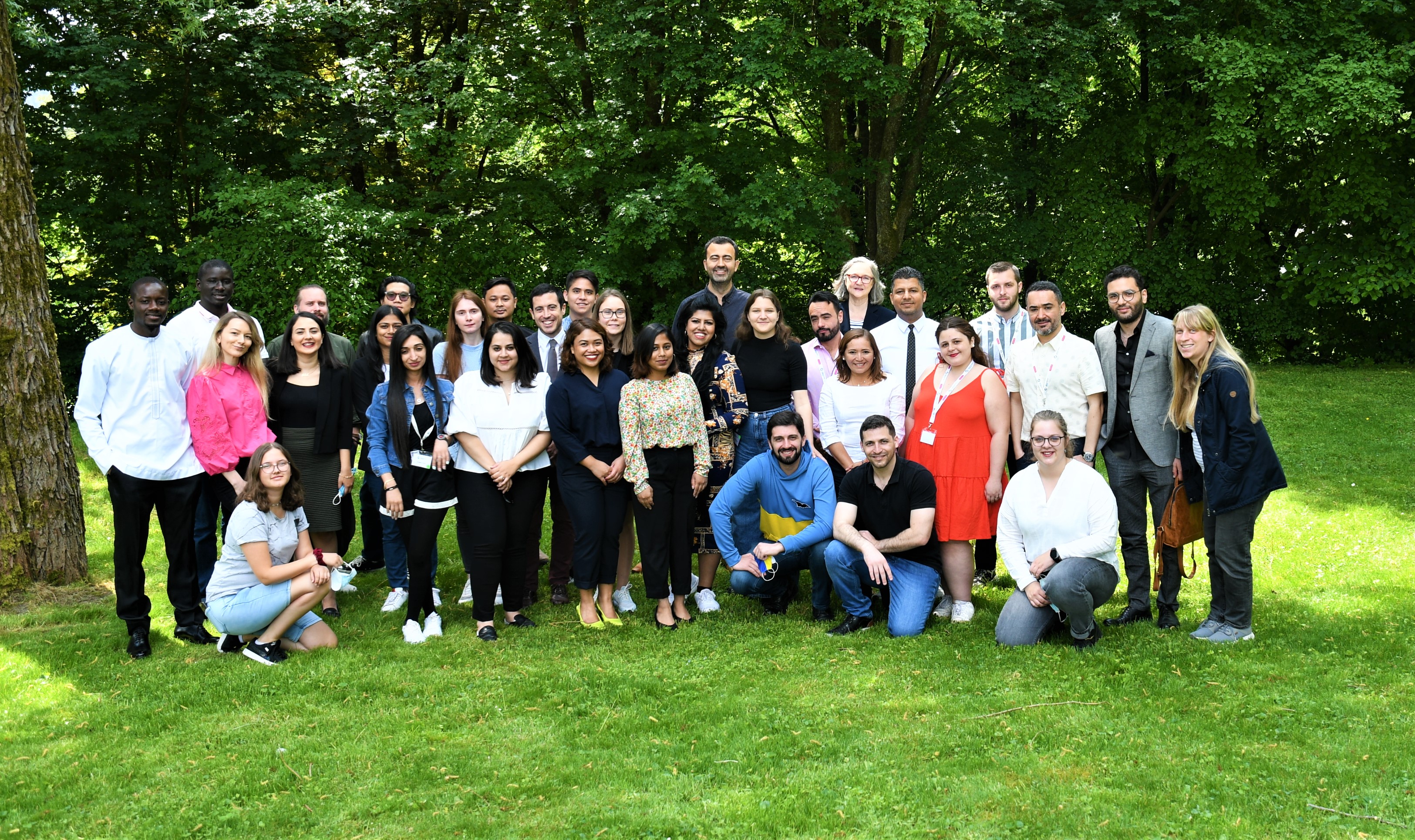
Back in June 2019, preceding a G20 meeting in Osaka saw Vladimir Putin giving an interview stating that the western concept of liberalism is ‘obsolete’. Nearly a decade prior, the failed Arab Spring uprisings to usher democratic transitions because of counter-crackdowns led to utter mayhem and unintended civil wars that are still evident today. And just a couple of years before that, in the aftermath of 2008’s global financial crisis, the basis for criticism towards modern globalization were visibly laid.
From its economic system, to its political framework and finally its socio-cultural dimension, the liberal’s version of the world has steadily deteriorated since post-9/11. And in its stead across the globe are often ambitious far-right extremists vying to fill power vacuums, or heavily tainted former autocrats looking for ways to make a comeback. More intriguingly, both types would employ what is loosely known as ‘populist’ politics as their modus operandi which causes intentional disruption towards the status quo.
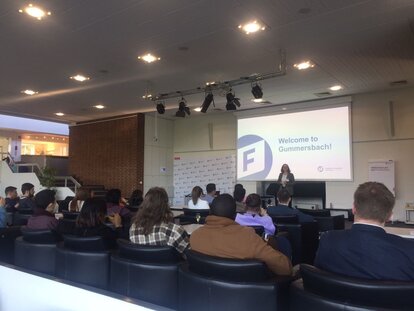
A Warm Greeting
Between 7th to 21st of May 2022, twenty-six participants from twenty-one different countries covering Latin America, Europe, Middle East and North Africa, South Asia, as well as Southeast Asia attended the International Academy for Leadership (IAF) course on “Liberalism versus Populism”. Organized by the Friedrich Naumann Foundation for Freedom (FNF), this group of participants was the 3rd batch to be hosted physically at the Theodor Heuss Akademie in Gummersbach, Germany.
The course kicked-off with a late evening briefing from the organizers, where they shared the foundation’s focal themes namely an emphasis on civic education programs, to enhance open societies, pursue social market economic agendas, and a necessary interest in international politics. The briefing continued with an insightful point on the three key indicators for a functioning liberal democracy; (i) presence of good democrats, (ii) strong public institutions and (iii) protection of essential freedoms/basic rights.
A historical run-through of Germany’s dark experiences with Nazism in the 1940s and the painful struggles during the Cold War era conflict that literally split its nation into two parts were also shared. It underscored the significance of preserving values such as ideological independence, spirit of inquiry, participatory engagement, and practice of decentralization that encompasses checks and balances, transparency, and accountability.
As none of the participants knew each other beforehand, ice-breaking sessions using random grouping were subsequently conducted, and it became the starting point for everyone to interact with one another. Over the two weeks of learning, eating and traveling together, whatever personal prejudices, political affiliations or religious sentiments among the participants were ‘suspended’ until eventually we formed an unexpected bond of friendship.
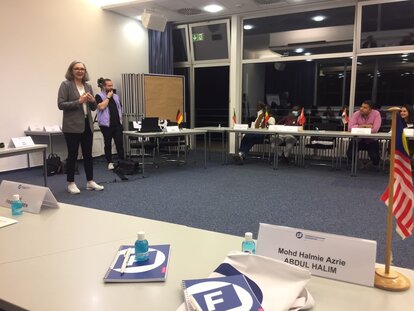
Starting From A Crossroad
From the onset, the premise for the entire course set by our brilliant facilitators, Sven Gerst and Radu Magdin, were mainly on three things. First, the liberal ‘family’s wasteful infighting. Second, their disconnect from those deemed outside the ‘family’. Lastly, its rigidity to move beyond ‘family’ legacies in conveying better ideas to suit present predicaments.
The first premise revolves around the problematic electoral approach favouring a ‘big tent’ agenda which attempts at assembling the varied spectrums or branches within liberalism, only to prompt severe disagreements within a progressive coalition. The difficulty in managing such diversity without a clear vision from its top leaders gives ‘ultra’ liberals licence to act harsh with others on trivial matters, leading to factional rivalries that hinders collaborations.
The second premise touches on how exclusively ‘elitist’ the proponents of liberalism have evolved in recent years. Obscure concepts of universality and complex jargons cited by capitalist like GDP or diplomats saying rules-based order, are often at odds with a layman’s encounter with inequality or understanding of plain common sense. Demagogues then depict modern liberals as intellectually condescending in maintaining hegemony, highly bureaucratic with their policies, and even corruptly hedonistic in pursuit of material gains.
The third premise alludes to a sense of ‘triumphalism’ as prematurely claimed by Francis Fukuyama in 1992. Indoctrinated with a linear view of progress and the false belief that everything is well or will get better, most of the liberal promises like ideal peace and shared prosperity fell short despite a brief ‘honeymoon period’ throughout the 1990’s that coincided symbolically with the fall of the Berlin wall. They became complacent with the liberal achievements, and were oblivious of their own blind-spots leading to multiple crises.
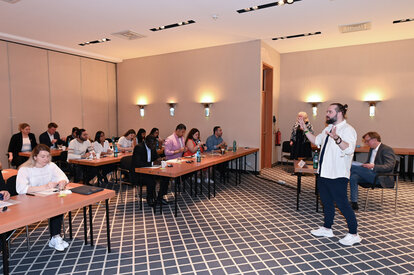
The Inconvenient Shocks
As with any journey, there are bound to be setbacks along the way. Such a slump in governance by ‘lame liberals’ were thoroughly discussed by the participants before delving into current trends involving the ‘populist perks’ budding worldwide. Their timely emergence to exploit the weaknesses of liberalism, heighten deep societal anxieties, and mobilise the public’s frustrations with democracy makes populism not just a credible counter vehicle but more alarmingly a serious existential threat to liberal values and traditions.
Liberalism’s intricate institutions, privileged leadership and sense of moral superiority all play directly into populism’s advantage to operate and thrive beneath the underlying discontents. They offer blunt proposals, a ‘macho’ aura and passionate rhetoric on self-identity to exaggerate cultural phobias. If it’s far-right populists then the romanticisation will use nationalistic nostalgias like symbols or tribal sentiments, while if it’s radical-left populists it deconstructs using egalitarian utopias of community or overthrowing the establishment.
During crisis situations, populists tend to put intense pressure onto existing structures and look for pragmatic ways to seize power. They fashion themselves as a necessary protagonist that represents drastic change to a decaying system that has failed the people. There are many instances throughout mankind’s history where populist leaders had come and gone, yet this time around there seems to be more sophistication and menace in their quests. The participants carefully explored how populism today is a total rejection of post-modernity.
Some points brought forth during our deliberations with the facilitators was that populists nowadays are skilled communicators in a highly digitalized world, with succinct strategies of targeting democracies undergoing transition, then advocating coherent protectionist or anti-globalist policies, before deliberately reversing or dismantling fundamental democratic institutions as well as curtail basic civil liberties when they manage to win seats of authority.
Here, I posited a minor remark to the discourse on the robustness of ideologies by using Hegel’s dialectic theory that assumes liberalism as the ‘theses’ to be confronted by populism as an ‘antitheses’, which eventually brings about a form of ‘syntheses’ as its by-product. This indicates some cautious optimism in favour of liberalism, provided that the liberal ‘family’ is serious for reforms and ready to close ranks in order to reach consensus.
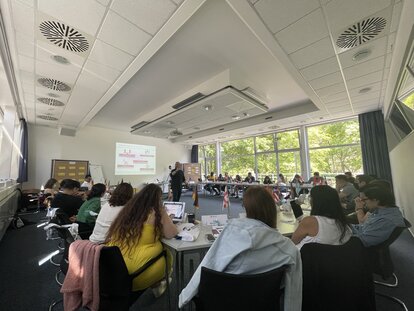
Path To Ignite Resilience
The participants would undergo a rather rigorous theoretical exercise from Sven’s enlightening inputs and adopt practical lessons from Radu’s interactive sharing that served as a well-balanced outline for all the group work as well as presentations. They helped unpack the contrasting set of values between liberalism and populism through ‘art labs’, besides using case studies and ‘tier lists’ to talk about Putin’s Russia, Erdogan’s Turkey, Orban’s Hungary, Kaczynski’s Poland, Trump’s America, Bolsonaro’s Brazil, Modi’s India and Duterte’s Philippines.
Several guest speakers in between the group works were also crucial in distilling the issues surrounding populism as a prevalent political phenomenon, not just some short-term reactionary movement. Populists are neither irrational or disordered as presumed by conceited liberals, but are in fact quite the contrary. They’re quick to notice new aligning issues or social debates which politics logically reorganises itself around. Furthermore, as a ‘thin’ ideology, it can plugin to other theories like the peculiar Traditionalist (perennialism).
Observations were also drawn on trends across generational gaps, with old age voters naturally remain conservative in rural or homogenous demographics but for a bulk of youths and disenfranchised voters feeling disillusioned with democracy would have tendencies to support either the progressive greens causes or even far-right nativist candidates instead of cosmopolitan liberals. This signals not a ‘decline of the centre’ but instead is a redefinition of that centre.
For political messaging, the participants dived deep into the ‘populist playbook’ through role playing as well as plenty of pop-culture references to conclude that populists are so appealing by having a relatable personality for the masses and concurrently project confident body language. They ‘frame’ themselves to be accessible with vulnerable or inspiring storytelling, then ‘reframe’ sharply by being on point to deliver ample backlash towards liberal democracies as scapegoats for every contemporary problem.
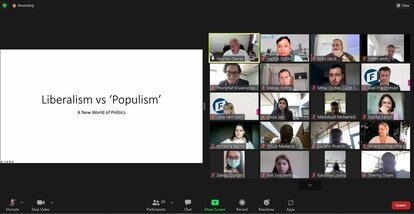
Plotting Those Destinations
After comprehending the aesthetics for these ‘agents of chaos’, the participants would venture out via excursions to Cologne and Berlin to listen in to an investigative author, an editorial journalist, a member of parliament and a think-tank director regarding illiberal efforts occurring across Europe and specifically in Germany. From the geopolitics of Russian funding as well as their toxification of international politics with cynicism and disinformation to the unravelling of vast far-right nationalist networks linked by cunning social outcasts.
Additionally, the speakers highlighted how covert advisors such as Steve Bannon, Aleksandr Dugin and Olavo de Carvalho tried to coordinate mainstreaming a psychological switch to favour so called ‘outsider’ leaders. Populist politicians become perfect vessels for manipulation due to their commanding theatrics and firebrand rants that energises fringe bases to become a ‘counter public’. Populists are also worshiped by purists as paternal ‘caretakers’, claiming to be in proximity with the ‘silent majority’ or ‘true people’ during troubled times.
Now, populism has advanced from ‘streets to Parliament’ by being embedded into national discourses. Their well-organised parties or representatives in many legislative bodies come with a lethal mentality of not ‘joining the dialog’ but to ‘end it altogether’. Most are fuelled on the triple threat of anti-immigrants, anti-refugees and anti-minorities derived from the ‘Great Replacement’ conspiracy, and are also anti-scientific evidence by denying experts. It is here where liberals must win the normalcy with decency against the populist’s paranoia and hostilities.
Enjoying Our Companionship
Complementing those fruitful intellectual exchanges were some memorable dinners, intermittent shopping, lots of casual chats, fun group photo-selfies and wonderful sightseeing among the participants. The brief escape away from polarising conflicts back home or embroiled in cultural wars between ‘the woke’ and ‘the supremacist’, or the bitter realities in dealing with contrasting opinions from within own communities, was something deeply appreciated by all participants. We ‘healed’ during those two weeks abroad.
Despite coming from completely different backgrounds, the participants managed to make compromises and tolerated each other’s unique characters. Few examples were when we tried to decide where to eat in Berlin, or where was the boarding gate at Cologne airport. There were tons of arguments with mixed levels of dominating behaviours, but ultimately everyone settled down, opened space for communication and made effort to cooperate as best they could. Such genuine stories outside of the official IAF course was certainly priceless.
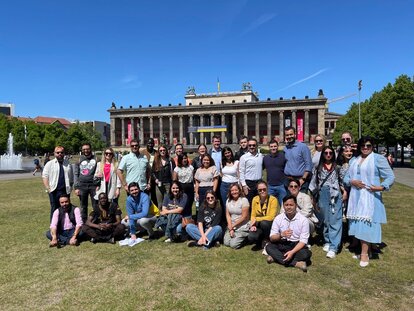
Road To Recovery
It’s not easy to rehabilitate trust towards liberalism after decades of assertions for social change on sensitive matters pertaining to race, gender and orientation to the point where it becomes too much ‘conversion’ for some segments in society. There are also valid concerns whereby more personal matters such as religion or even private affairs like family ties are being dragged into public domain and become politicised.
Hence, it is paramount to put the spotlight on the correct sort of grounded individuals that appreciate the contextual nuances when grooming future successors to be worthy of national positions. Liberals must show better credibility than outrageous populists, and make improvements to its contemporary remedies that encourages open movements, pursues inclusive processes and celebrates diverse freedoms.
Lastly, it is imperative for liberals, democrats and progressives alike to reinvent themselves into becoming an exciting ideology once again. Taking advice from the final session with experts from Poland and Hungary upon returning back to Gummersbach, it is important to learn being patient, stay ethically firm and be data driven. We must not underestimate the populists or tyrants that enjoys eliminating competition, controls the media, alters history, restrict civil societies and replaces good governance with appointed loyalists.
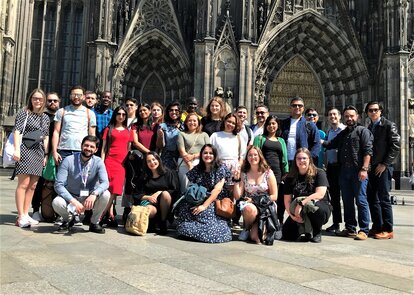
It seems appropriate then for me to share some conversations I had with a wise young lady from the course. “…sometimes in an age of anger and exhaustive emotions, it is better to be rational and capable of remaining calm to manage tense situations”. Similarly, “…when you find yourself in a new environment or facing an unfamiliar problem, its sensible to spend 70% analysing or observing, and the remaining 30% for you to act upon it. Pick your battles. Reduce the risks of mistakes or regrettable errors. This optimises the quality of your choices.”
Thank you for those illuminating chats.
*Halmie Azrie is a researcher at IDEAS and a representative for Malaysia. He’ll always reminiscent those moments in Gummersbach & Berlin by listening to Toploader’s cover of ‘Dancing In The Moonlight’.
